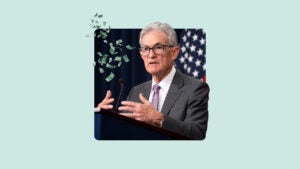Is a 2025 recession coming? Take these 5 steps to recession-proof your savings now

The warning signs of a potential recession in 2025 are growing stronger.
JPMorgan Research recently raised its recession forecast probability to 50 percent and Apollo Global Management’s chief economist Torsten Slok said in late April that if the current tariff regime by the U.S. government remains in place, the U.S. “will absolutely have a recession in 2025.”
Former Federal Reserve Bank of New York president Bill Dudley painted an even grimmer picture, suggesting that a scenario in which the U.S. economy shrinks while inflation remains high could be “the optimistic scenario,” if tariffs remain in place. “More likely,” he wrote, “the US will end up in a full-blown recession accompanied by higher inflation” potentially exceeding 5 percent annually.
These forecasts come from respected economic authorities, not doomsayers prone to fear-mongering. So, it’s time to get real. If you’re not currently positioned to weather an economic downturn, now is the time to get ready for what could be on the horizon.
We can’t control the economy, but we can control how we react to it. Here are five practical steps to position your savings for a possible 2025 recession.
Step 1: Create a budget
Experts say knowing is half the battle, so taking inventory of your income and expenses is the foundation of financial preparedness. Once you know how much you’re spending each month, you can identify what expenses could be cut in the event of a job loss or unexpected life event.
Creating a budget will also tell you how much money you should be saving in an emergency fund. Many financial planners recommend building a cash reserve equivalent to six months of spending. Before you start putting money away in savings, put together a budget so you know how much you need to save.
Even if your job remains secure during a downturn, reviewing your spending habits now gives you an opportunity to trim non-essential expenses, increase your monthly cash flow and reduce financial stress.
Step 2: Reduce high-interest debt
Credit card debt and other high-interest debts can go from being a source of tension to a source of financial instability during recessions, especially if job loss or income disruptions occur.
According to Bankrate’s 2025 credit card debt survey, 48 percent of U.S. cardholders carry a balance from month to month, which can quickly become unmanageable if economic conditions worsen. Before you exclusively focus on growing your savings, take the time to pay down high-interest balances, starting with the highest-rate debts first. If you have multiple outstanding credit card debts or loans with high interest rates, consider consolidating debt with a fixed-rate personal loan or explore 0 percent APR balance transfer offers if you have strong credit and a solid plan to pay it off during the promotional period.
Step 3: Build an emergency fund
A robust emergency fund is your first line of defense against recession-related hardships. If you don’t already have savings to cover at least six months of non-essential spending, it’s time to take action.
The most effective approach to building an emergency fund is automation. Consider setting up a split direct deposit to automatically divert a portion of each paycheck into your emergency fund. This “set it and forget it” approach ensures you’re consistently building a financial cushion without requiring constant willpower.
Step 4: Maximize your savings rate
All savings accounts are not the same. Where you keep your emergency fund matters significantly, especially in today’s high-inflation environment. Many savers are missing out on substantial interest by keeping their cash in traditional bank accounts with low yields.
The national average savings account yield is 0.60 percent APY, according to Bankrate’s survey of institutions (May 2, 2025). But many of the nation’s largest banks are paying much less — often a mere 0.01 percent to 0.05 percent APY.
Hundreds of millions of Americans still keep their money at these banks, including Chase, Wells Fargo and Bank of America, which pay rock-bottom APY for savings accounts, says Gary Zimmerman, CEO of online banking firm MaxMyInterest, which allows customers to open accounts with multiple banks and automatically transfers cash to the highest yielding.
“You’re losing money every year,” says Zimmerman. “You think it’s safe, but you’re actually losing real purchasing power, because the interest rate they pay is less than the rate of inflation.”
Meanwhile, some online banks are offering savings rates above 4 percent in savings and money market accounts as well as in certificates of deposit (CDs). You can compare Bankrate’s best high-yield savings accounts to find the best place for your money.
The difference in earnings between traditional and high-yield accounts over time is significant over time. Consider this example: $1,000 initial deposit with $500 monthly contributions over 10 years.
- With a high-yield account at 4% APY: $73,517
- With an average savings account at 0.59% APY: $62,679
- Difference: $10,838
Check out Bankrate’s savings calculator to learn how much you could earn on your money.
Step 5: Watch where you put your money
Not all financial institutions offering high yields provide the same level of security for your deposits. Zimmerman warns that savers should be cautious about where they’re putting their money, particularly with some fintech and online-only financial institutions that use so-called cash sweep programs to pool depositor funds together.
A cautionary tale emerged when Synapse Financial Technologies, which powered fintech platforms like Yotta, Juno and Mainvest, filed for bankruptcy in April 2024, leaving millions of dollars in customer funds frozen and unaccounted for.
Yotta, Juno and Mainvest had offered high yields and even advertised that they held money in FDIC insured banks like Lineage Bank and Evolve Bank & Trust. But, many savers who thought their money was safe in individual accounts received notices that some or all of their money was missing after the bankruptcy filing.
Some fintech platforms that offer high yields can lump customers’ money together in slush accounts that aren’t necessarily protected by an FDIC guarantee. This is why it’s important to read the fine print when signing up for a high-yield savings account. Knowing that your money will be held in an individual account under your name at an FDIC-insured bank will help protect your cash in the event that an economic downturn pushes your financial institution to insolvency or bankruptcy.
For savers with substantial emergency funds, Zimmerman recommends using multiple bank accounts to ensure all deposits remain within FDIC insurance limits.
Bottom line
A U.S. recession in 2025 is certainly not guaranteed, but the warning signs are significant enough to warrant preparation. Reducing debt, boosting savings and putting yourself on a path to maximize your savings are all steps that will help weather the next recession, whenever it comes.
Why we ask for feedback Your feedback helps us improve our content and services. It takes less than a minute to complete.
Your responses are anonymous and will only be used for improving our website.
Bankrate's Expert Contributors
Our Expert Contributors are a select group of creators, experts and thought leaders who share first-person perspectives on finance and its intersections with our lives.
Meet our expertsYou may also like

Are banks safe in a recession?





